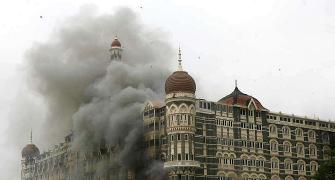'Why has the rhetoric gone down on the Indian side, Durrani wondered aloud.'
'I said because almost total normalcy and peace had returned on the ground in Kashmir,' recalls Shekhar Gupta.
'The general gave me that career spook's laser look. And he said: "That situation on the ground can change in no time".'
'This was precisely when the Pakistanis began their first incursions into Kargil.'
'Durrani had been retired for five years.'
'But once the ISI boss, you are always in the know.'

Illustration: Rediff.com/Uttam Ghosh
It is a much spoken truism that there is honour among thieves. But is there honour among spies too?
The history of espionage is filled with evidence that such things can and do happen more often than we would think, even during the Cold War.
Rival antagonists meet, talk, develop mutual respect and do sometimes display personal affection as well.
The reason we explore this unusual area is that of late the Indian and Pakistani media have been abuzz over revelations in a commendable joint effort by former spy chiefs of the two sides, former Research and Analysis Wing chief A S Dulat and former Inter-Services Intelligence boss Asad Durrani, who served in different periods.
The anchor of these remarkable conversations is journalist Aditya Sinha.
It is known that the spy chiefs (or national security advisors) of the two countries at various points meet secretly at distant places (Thailand is convenient).
In this book (The Spy Chronicles: RAW, ISI and the Illusion of Peace) there is the touching story of how RAW helped Asad Durrani's son caught by the Bombay police at the airport for a visa violation and they never even let it be known that he was a former ISI chief's son.
Durrani had long retired by then. But he had his 'goodwill' with Dulat, who spoke to then RAW chief Rajinder Khanna.
There were secret conversations even while some of our spy chiefs were in service.
Not long before he passed away, Anand Verma, director of RAW under Rajiv Gandhi, made stunning revelations in an op-ed in The Hindu of his secret negotiations with the notorious Lieutenant General Hamid Gul, then ISI chief.
In negotiations, mostly conducted overseas, and later on public phone lines using code words and signals, he said they came close to settling the Siachen dispute and also de-escalating Kashmir.
He also revealed that to build confidence, Gul handed over to India, in a covert operation, four soldiers of Sikh units who had deserted in the mutinies following Operation Blue Star in 1984 and defected to Pakistan.
The process, he wrote, was initiated by Pakistan and had the blessing of Rajiv Gandhi and General Zia-ul Haq.
He wrote that for the first meeting Rajiv sought the good offices of then crown prince Hassan of Jordan. He was a personal friend of Rajiv's (remember the controversy then of India allowing traffic rights to Royal Jordanian Airlines and the prince gifting Rajiv a fancy car).
Hassan had great goodwill in Pakistan too (his wife was of Pakistani origin).
This stopped because Zia was assassinated. Verma suspected his assassination may have had something to do with his own army commanders' disapproval of his peacemaking.
And the only civilian at the other end, then former foreign secretary Niaz Naik (we had known him well as Pakistan's high commissioner to New Delhi), was also found dead in mysterious circumstances in the course of time.
- MUST READ: After The Lahore Summit: The Real Story
It all adds up to a neat conspiracy theory.
Certainly, Verma, a very cautious and understated spook as most Indians of the pre-Dulat/Raman generation were, waited nearly three decades to make this revelation.
He was also evidently provoked by Gul's death then.
I do believe Verma to have been truthful in his recollections. I attended a series of such Track-II meetings. One of these, called the Balusa Group, also had one round hosted by Prince Hassan in Amman.
It included one former Indian Air Force chief Air Chief Marshal S K Kaul, his brother and former Cabinet secretary and India's ambassador to the US P K Kaul, occasionally Lieutenant General Satish Nambiar, former Pakistani army vice-chief General K M Arif, and top industrialist Babar Ali (he hosted one session in Lahore at Pakistan's finest management institute, LUMS, that he had helped set up).
Of course, one of the most sincere members of the group was retired Major General Mahmud Durrani (no relation of Asad), by far the most sensible, pacifist and soldier-like Pakistani general you've ever met.
No surprise that commando-comic Pakistani commentators gave him the pejorative 'General Shanti'.
Later, in 2008, as Pakistan's national security advisor, he showed the moral courage and honesty to admit that Ajmal Kasab was a Pakistani and there was no point denying that fact. He paid for it with his job.
That he was a Pakistani patriot, and a tough soldier, nobody could doubt. He fought India as a young tank commander in defence of the Sialkot sector, particularly the viciously contested battles of Philora and Chawinda where India's strike corps, led by 1 Armoured Division, advanced.
At one of the Balusa meetings at Lake Bellagio in Italy on a long evening walk, he recounted to us his story of 1965.
It was a mindless slugfest, he said, as generals on both sides lacked tactical dash or initiative. Except in one case.
He said the only truly brilliant and audacious tactical move from "your side" was made by Lieutenant Colonel A B Tarapore, who led his regiment in assault, but was killed in artillery shelling.
Colonel Tarapore was awarded one of the two Param Vir Chakras of that war.
Mahmud Durrani had found Tarapore's body and still held him in fellow cavalry man's respect.
There was much talk then of India having escaped a 'near thing' not once but twice in 1987-1988. Except that the first was a war, during Brasstacks in 1987, and the second, peace in 1988.
It was 'common knowledge', though never officially stated or confirmed by any of the players, that a Siachen deal was almost clinched -- again mostly through these behind-the-scenes, 'spooky' contacts.
This is why this mood had turned so dramatically from war to peace and then the status quo.
- MUST READ: How Zia's death killed a Siachen pact
I do agree with the suggestion Verma made then that the Pakistani Deep State got rid of Zia because he was seen becoming soft. But I also believe that rather than a peacenik-come-lately, Gul was more likely part of that plot.
A president and military dictator was killed under Gul's watch as ISI chief and he continued in that job for a year afterwards, removed by Benazir Bhutto.
Not fired, just moved to command a vital corps in Multan. Later he became a lifelong freelance jihadi.
- MUST READ: The day Zia died
Postscript: I first met Lieutenant General Asad Durrani at a Track-2 type India-Pakistan conference organised in the Maldives' Kurumba Village Resort (near Male) by the reputed, London-based International Institute of Strategic Studies.
It was the winter of 1998 and it seemed as if some calm had returned to India-Pakistan relations under Atal Bihari Vajpayee and Nawaz Sharif.
Why has the rhetoric gone down so dramatically on the Indian side, Durrani wondered aloud. I said, because almost total normalcy and peace had returned on the ground in Kashmir.
I saw the general look up, forehead creased, and give me that career spook's laser look. And he said: "That situation on the ground can change in no time."
This was precisely when the Pakistanis began their first incursions into Kargil.
Six months later, and exactly 19 years to date, the two armies were fighting there. Durrani had been retired for five years.
But once the ISI boss, you are always in the know.
By Special Arrangement with The Print










